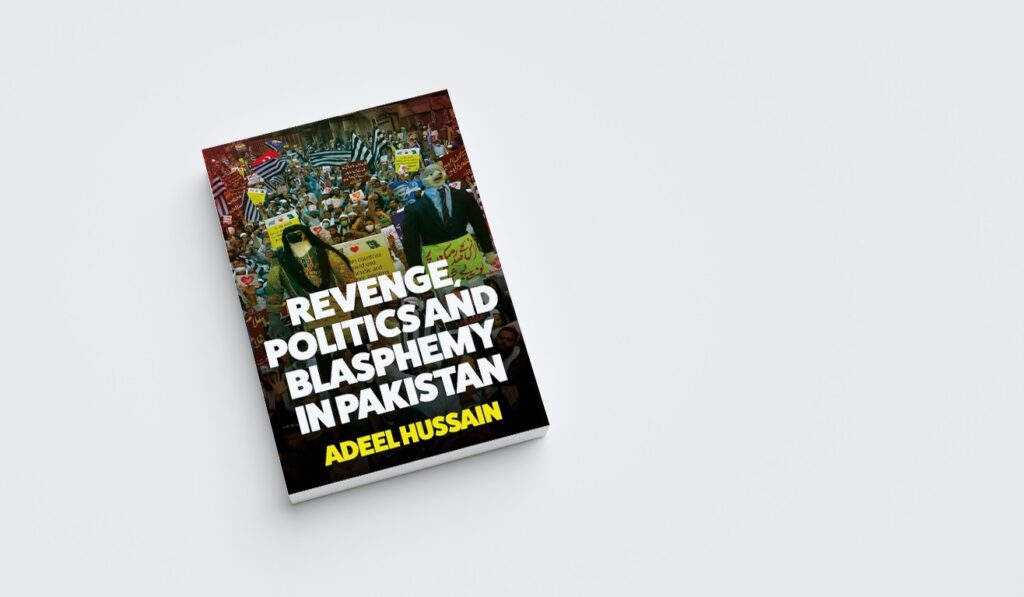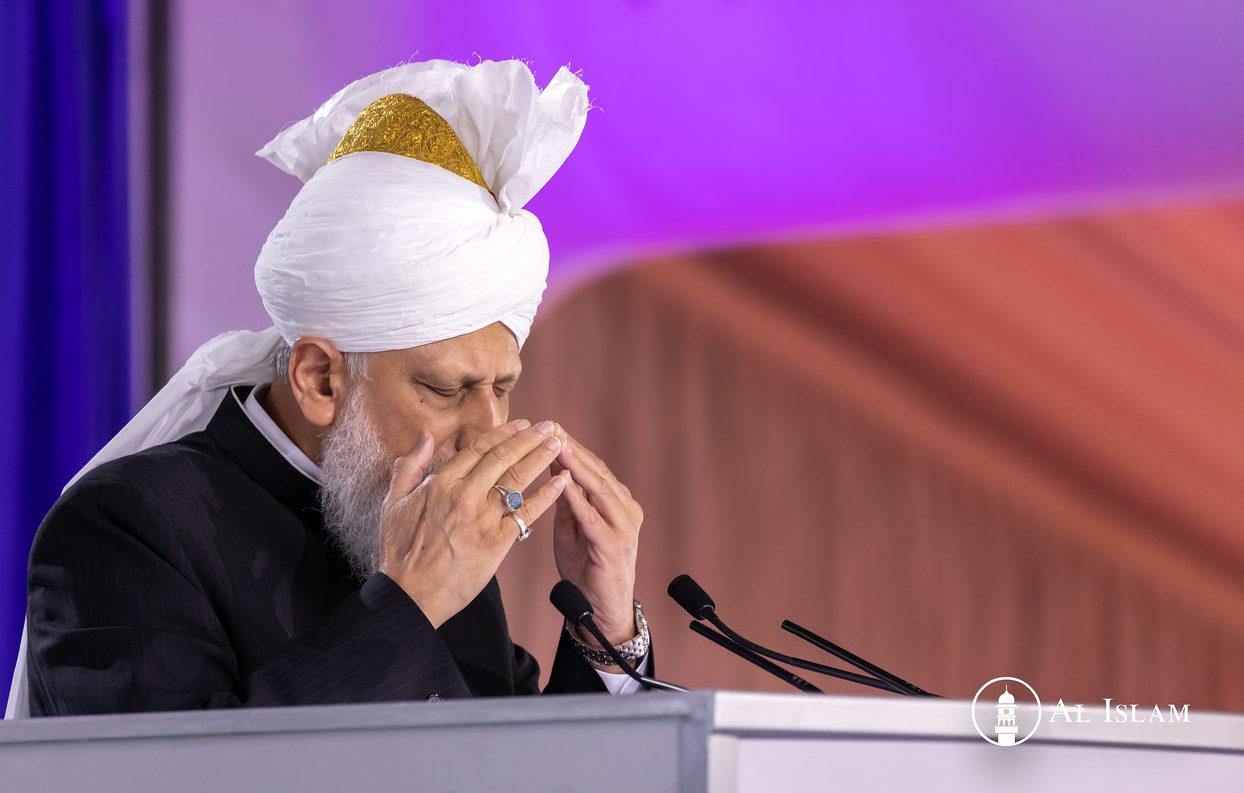The Ahmadiyya response to blasphemy has always been peaceful, seeking to defend the honour of the Holy Prophet(sa), employing no means that constitute or endorse violent retribution.
MOHAMMAD HAMEED KAUSAR
OCTOBER 21, 2023
In his book Revenge, Politics and Blasphemy in Pakistan, Adeel Hussain seeks to explore the historical roots of blasphemy laws in Pakistan. The book and the narrative it presents have sparked academic discussions, with numerous articles drawing upon its portrayal of the topic. For instance, an article published in Frontline a few months ago titled How Blasphemy Law Is Used Against Minorities in Pakistan relies on this work. The book extensively references the Ahmadiyya Muslim Community and its Founder, Hazrat Mirza Ghulam Ahmadas. However, some of these references are misleading and may push readers to form incorrect judgments about certain views of the Community. Therefore, this article aims to provide clarifications regarding certain aspects of Ahmadiyya beliefs as a rejoinder.
Let me state at the very onset that the Founder of the Ahmadiyya Muslim Community, Hazrat Mirza Ghulam Ahmadas, has always been a proponent and practitioner of respecting and upholding the honour and dignity of all prophets and holy figures of all religions. He says in one of his writings:
“Therefore, this principle lays down the foundation of love, peace and harmony, and supports moral values, in that we consider all those prophets true who appeared in the world—whether in India, or Persia or China or any other country. God instilled their respect and grandeur in the hearts of millions and made firm the roots of their religion, which remained established for centuries. This is the principle that the Quran teaches us. In the light of this principle, we honour all religious founders who fall under this description whether they are the founders of the religion of the Hindus, or the religion of the Persians, or the religion of the Chinese, or the religion of the Jews or the religion of the Christians. Unfortunately, our adversaries cannot treat us this way.”[1]
The Ahmadiyya Muslim Community was founded during a period when Islam faced vehement attacks from Christian and Arya Samaj opponents. They raised unfounded objections against Islam and the Holy Prophetsa. The Holy Quran was interpreted in a way that distorted its meaning, and the life of the Holy Prophetsa was misrepresented, leading many Muslims to abandon their faith. The renowned poet of that time Altaf Hussain Hali captured this dire situation in an Urdu couplet:
There remains neither the faith nor Islam;
What remains is just the name of Islam.
During that time, it was only the Founder of the Ahmadiyya Muslim Community, Hazrat Mirza Ghulam Ahmadas, the Promised Messiah, who had true sympathy for the condition of Islam and was sincerely concerned about safeguarding the honour of the Holy Prophetsa. He says:
“Ever since I was sixteen or seventeen, I have been reading books by Christian authors and have reflected over the allegations that they tend to raise. On my own accord, I have collected the objections which they level against the Holy Prophet, peace and blessings of Allah be upon him, and thus far, they have reached a total of approximately 3,000 in number.”[2]
Criticism ought to be civil
In 1898, a foul-mouthed individual named Ahmad Shah Shaiq of Kashmir, who had converted from Islam to Christianity, wrote a book titled Ummahatul Mumineen with the sole intent of defaming the Holy Prophetsa and his noble wives. The book, which contained a highly distorted and offensive portrayal of the Prophetsa, was widely distributed among the masses, immensely hurting the sentiments of Muslims. Some even demanded the government to ban its circulation.
During this period, Hazrat Ahmadas issued a memorial to the Lieutenant Governor of Punjab, stating:
“Islam is a sacred and sagacious religion. It does not deem permissible the use of force in matters of faith. Hence, it is imperative that the door of religious freedom remains open so that people may advance in religious knowledge and wisdom. And since there is another world after this world, preparations for which ought to be made here itself, each person possesses the right to question every religion with good intentions. However, it is necessary that this task be undertaken with civility and decency. But in the book Ummahatul Mumineen, our beloved Prophet, peace and blessings of Allah be upon him, has been addressed using the most indecent and grossly offensive words. And all this has been done by such a people that lay claim to civilisation. Nevertheless, we have been commanded by the Holy Quran to convey the message of God to the People of the Book in the best manner, demonstrating wisdom and goodwill. Islam is not a weak and helpless faith that is incapable of responding to attacks made against it. Therefore, the government may take any action at its discretion based on its national laws with regard to the book Ummahatul Mumineen. But our duty will only be to respond to its objections – which, in reality, are raised out of sheer ignorance or with the intent to deceive – with courtesy and politeness. In this way, the acceptance of this book will diminish by itself.”[3]
From the very beginning, the Founder and Caliphs of the Ahmadiyya Muslim Community have stood by the principle that the questions raised respectfully by the opponents of Islam should be responded to. It would then be left to the discerning audience to form their own judgement about the veracity of such allegations. This approach will serve to demonstrate the truth of Islam and the Holy Prophetsa to the world.
Islam prescribes no punishment for blasphemy
The Ahmadiyya response to blasphemy has always been peaceful, seeking to defend the honour of the Holy Prophetsa and employing no means that would constitute violence in any form. As such, the Community has always repudiated violent protests and demands for the killing of blasphemers of the Holy Prophetsa, who never avenged or imposed physical punishments for those who insulted him.
One such incident relating to Abdullah Bin Ubayy has been recorded in the books of Islamic history. Despite Abdullah’s blatant blasphemy, the Holy Prophetsa unconditionally forgave him and took no punitive measures. Similarly, the Holy Prophetsa endured abuse and physical torture at the hands of the Quraysh in Mecca for thirteen years. However, when God Almighty granted him victory over his oppressors, he declared a general amnesty to them. These examples illustrate that the notion of Islam prescribing capital or any other physical punishment for blasphemy finds no support in the Quran or the blessed life of the Holy Prophetsa.
A flagrant misrepresentation of the Ahmadiyya stance on blasphemy
In the book, Hussain erroneously claims that the Ahmadiyya Muslim Community played a role in popularising today’s pervasive emotional response towards blasphemy, citing the debate between Hazrat Ahmadas and Lekhram as an example[4]. This assertion grossly misrepresents and stands in stark contradiction to the beliefs of the Community.
Lekhram, a member of the Arya Samaj, was a vehement opponent of Islam who frequently insulted the Holy Prophetsa. He used to publish offensive literature against Islam and make a mockery of Quranic verses. To Lekhram, Prophet Muhammadsa was, God forbid, the worst of all human beings, and the Holy Quran was the most useless piece of literature.
Hazrat Ahmadas employed all means to urge Lekhram to present his criticisms in a civilised manner and said that he would provide refutations to his allegations with rational arguments. However, Lekhram persisted in his abusive language. In light of this, Hazrat Ahmadas sought Divine guidance in the matter through prayer. He was informed that unless Lekhram refrained from his abusive behaviour, he would meet a disgraceful end within six years, starting from February 1893. As a last resort, Hazrat Ahmadas offered to withhold the publication of the prophecy if Lekhram refrained from insulting Prophet Muhammadsa. Regrettably, Lekhram became even more rebellious and surpassed all limits in his vilifications. Finally, on 6 March 1897, Lekhram fell victim to his own arrogance and died mysteriously, becoming a sign of the truth of Islam.[5]
It is highly unfair to interpret this episode as Hazrat Ahmadas endorsing physical punishment for blasphemy, while he always argued that the punishment for such insolence is a matter that God has reserved for Himself.
Quite contrary to what Hussain wrongly assumes, Hazrat Ahmadas only urged the government to restrict disrespectful language against the Holy Prophetsa or any religious person in general. Otherwise, he consistently emphasised the importance of discourse and debates that demonstrated values of decency and civility. Sadly, the British government took no measures in this regard at that time, as in those days, the Christian missionaries were also actively involved in reviling the Holy Prophetsa.[6]
After Hazrat Ahmadas, the Caliphs of the Ahmadiyya Muslim Community also adhered to this same principle when addressing instances of blasphemy. They did not advocate physical punishment against such offenders, much less any act of public vengeance. Instead, they emphasised the need to impose restrictions on insulting speeches.
One such instance occurred during the time of Hazrat Mirza Bashiruddin Mahmud Ahmadra, the Second Caliph of the Community, when a member of the Arya Samaj named Rajpal published a book Rangila Rasul (Playboy Prophet). Another Hindu wrote an offensive article titled Sair-i-Dozakh (A Trip to Hell), published in Risala-i-Vartman. In response, His Holiness drew the government’s attention to the fact that such impertinence had the potential to provoke Muslims and lead to improper reactions, ultimately disrupting the peace of society. He persuaded the government to restrict such insulting language and blasphemous remarks[7]. This was also in view of preserving societal harmony and preventing any act or speech that would demolish the peaceful atmosphere of society. It is beyond unjust to construe this rightful demand to curtail unbridled freedom to vilify revered figures as an endorsement of physical chastisement or public retribution.
Hussain goes on to argue that the same blasphemy laws that the Founder of the Ahmadiyya Muslim Community and his followers once used against those who reviled Prophet Muhammadsa are now employed against Ahmadis in Pakistan, where they have been declared non-Muslims.[8]
Firstly, this argument lacks any factual basis. As already stated, the Ahmadiyya Muslim Community never advocated physical punishment against the blasphemers of the Holy Prophetsa. Secondly, following this line of reasoning, we will be compelled to accept the allegation of Jews and Christians that the same means with which the Holy Prophetsa confronted his enemies were later employed by the so-called Muslims against his grandson. Both arguments lack substance and are void of logic.
Another baseless conjecture
Hussain also contends in his book that the literary efforts of Hazrat Mirza Ghulam Ahmadas in the service and defence of Islam lacked rational validity.[9]
The hollowness of this claim becomes evident when one considers just one of the books of Hazrat Ahmadas, Barahin-e-Ahmadiyya, which is regarded as his masterpiece work in defence of Islam. Ironically, it is this book that Hussain takes a particular interest in to argue that Hazrat Ahmadas’s arguments fell short of rational reasoning.
The truth is, in Barahin-e-Ahmadiyya, Hazrat Ahmadas firmly establishes the truth of Islam, the Holy Quran, and the Holy Prophet of Islam. He issued a challenge to the scholars of other faiths, inviting them to come forward and present a similar number of arguments from their scriptures for the truthfulness of their religion as he had presented in his book in favour of Islam. He also suggested that if they were unable to match the full number of arguments, they could present half, one-third, one-fourth, or even one-fifth of the arguments. Alternatively, if they were incapable of even this, in the least, they should refute the arguments Hazrat Ahmadas had presented in his book.[10]
In any case, he said, he would reward the person who successfully meets the challenge with his property worth ten thousand rupees at that time, without any excuses, provided that three judges, acceptable to both parties, unanimously declare that the conditions of the challenge have been met.[11]
However, to date, none dared to take up this challenge as per the conditions stipulated by Hazrat Ahmadas. Instead, the opposite has been the case. Hussain is kindly apprised that Barahin-e-Ahmadiyya was critically acclaimed by the scholars of that time, who praised the book for both its logic and eloquence[12]. It has also been the reason for many to acknowledge the truth of Islam and embrace the faith, and it still continues to be so. Such an outcome would not have been possible if the arguments presented within it were void of rationality.
The Ahmadiyya response to the cartoons of the Holy Prophetsa
The Ahmadiyya protest against blasphemy – peaceful yet powerful – is further exemplified by the Community’s response to the attacks on the revered person of Prophet Muhammadsa that has become common in the modern days.
Some years ago, when extremely disrespectful cartoons of the Holy Prophetsa were published, the Current Worldwide Head and the Fifth Caliph of the Ahmadiyya Muslim Community, Hazrat Mirza Masroor Ahmadaba, addressed the global audience and offered valuable guidance through a series of speeches and directives on how to respond to such situations.
In one of his Friday Sermons[13], His Holiness condemned the cartoons as acts that provoke the wrath of God. He referred to the prophecy of Hazrat Ahmadas about natural calamities and epidemics, emphasising that it was not a time to challenge God’s honour, as He possesses the power to safeguard the honour of His beloved.
Furthermore, His Holiness addressed the Muslim countries, urging them to align their actions with the life and teachings of the Holy Prophetsa. He reminded them to follow in the footsteps of the Messiah of this age, whom God had appointed to establish the true and peaceful teachings of Islam.
In response to such insults, His Holiness encouraged Ahmadis, as followers of the Messiah of the age, to exemplify the true and noble image of Prophet Muhammadsa.
In conclusion, I reiterate that the Ahmadiyya Muslim Community’s stance on blasphemy aligns with the principles of respect, reasoned discourse, and justice. It is important to distinguish the Community’s perspective from misrepresentations and acknowledge its adherence to Islamic values, which are reflected in its beliefs and actions.
(Translated from Urdu by Light of Islam)
The author is a senior scholar of the Ahmadiyya Muslim Community with over three decades of service as an Ahmadiyya missionary. He currently serves as the Director of Outreach for North India.
REFERENCES
[1] A Gift for the Queen, an English rendering of Tohfa-e-Qaisriyya p. 6-7
[2] Malfuzat v. 3 p. 151
[3] Tarikh-e-Ahmadiyat v. 2 p. 10
[4] Revenge, Politics and Blasphemy in Pakistan p. 9
[5] Tarikh-e-Ahmadiyat v. 1 pp. 590-591
[6] Tarikh-e-Ahmadiyat v. 2 p. 20
[7] Tarikh-e-Ahmadiyat v. 4 pp. 609-610
[8] Revenge, Politics and Blasphemy in Pakistan p. 11
[9] Revenge, Politics and Blasphemy in Pakistan, ch. Rebirth
[10] Barahin-e-Ahmadiyya, v. 1 pp. 46-59
[11] Ibid pp. 48-49
[12] An Introduction to the Hidden Treasures of Islam pp. 23-25
[13] Friday Sermon dated 17 February 2006












2 Comments
Professor A.H.Mir · October 22, 2023 at 2:41 pm
A logical and rational rebuttal by Moulana Kousar sb on of the misleading objections raised by Mr.Hussain in respect of Ahmadiyya point of view on blasphemy and a wilfull renunciation of Islam by any one, in consonance with the teaching of Islam and the practice of Holy Prophet of islam(saw) in his lifetime.This peacefull practice was carried forward by the founder of the Ahmadiyya Movement while defending and responding to the baseless and unfounded objections on Islam and the Holy Prophet (saw) by some zealot Christians and Arya samajies.Islam in essence means peace and peaceful and respectful should be the ways followed by Muslims in a dialogue about any misconceptions or a differing points of view with followers of other religions. Members of Ahmadiyya community extend and explain their view point on any differing opinions with due patience,logic and rationality .
Farhan · October 23, 2023 at 4:28 pm
Would you characterise the way that Mirza Ghulam Ahmad talked about other religions ans disrespectful and uncivil? For example, Essence of Islam volume 3 chapter 7 on dajjal is full of quotes which insult Christianity and worse christians themselves. Here are a couple of examples. “As Christianity is the perfect manifestation of Satan, Surah Al-Fatihah makes no mention of Dajjal, but prescribes supplication for refuge against the evil of the Christians.” And… “In this verse too the word Nas refers to the Dajjal…. Mentioning these people at the end also indicates that this group of people will be supreme in the latter days, and they will be accompanied by: [Quran verse here] i.e., Christian women who will go from house to house seeking to separate wives from their husbands, and to break the bond of marriage.” For anyone thinking these quotes are being taken out of context, please go read the whole chapter. If anything reading it in context makes it worse. How would you characterise Christian women being called home wreckers?